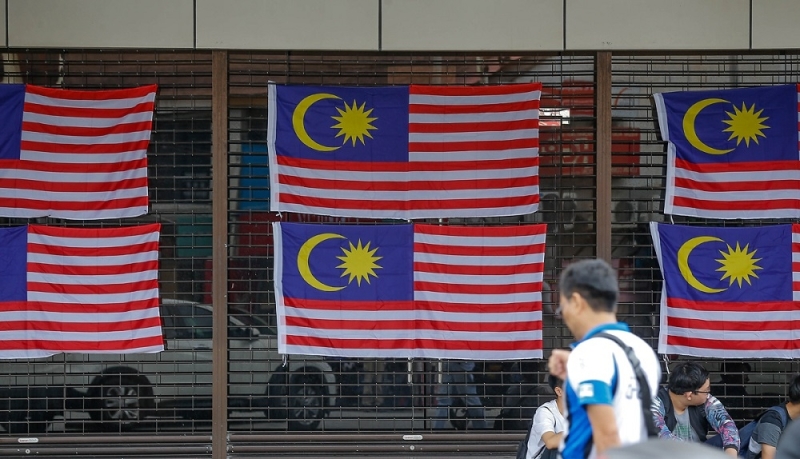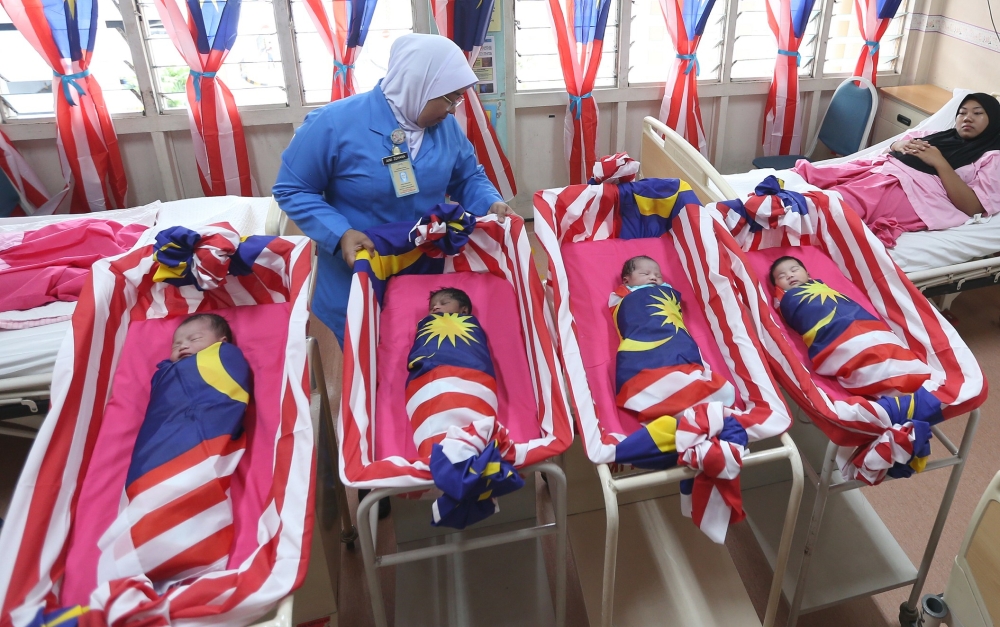New citizenship rules could leave foreigners wed to Malaysian men stateless or stuck in abusive marriages, group cautions

According to Family Frontiers, the government has proposed a clause that revokes the Malaysian citizenship of the wife if her marriage to the Malaysian man ends within two years of her getting citizenship. — Picture by Sayuti Zainudin
Tuesday, 04 Jul 2023 4:39 PM MYT
KUALA LUMPUR, July 4 — Foreign women who marry Malaysian men could face two potential dangers if the government proceeds with new citizenship rules, according to Family Frontiers, a group that has been speaking up on rights for women and stateless people.
The group, officially called the Association of Family Support & Welfare Selangor & Kuala Lumpur, said the first could see the non-Malaysian wives turn stateless, while the second could force them to endure domestic abuse to avoid statelessness under a proposed amendment to the Federal Constitution that actually aims to grant them Malaysian citizenship.
According to Family Frontiers, the government has proposed a clause that revokes the Malaysian citizenship of the wife if her marriage to the Malaysian man ends within two years of her getting citizenship.
“While at first glance this may seem like an appropriate measure to address what is colloquially known as ‘marriage of convenience’ (marrying for the purpose of obtaining citizenship), it makes the foreign spouse extremely vulnerable to potential violence and abuse without the ability to extricate herself from the situation without now risking her citizenship,” the group said in a statement yesterday.
Currently, under the Federal Constitution's Article 15(1), women married to Malaysian men are entitled to apply to be a registered Malaysian if she can satisfy the government’s requirement that she has lived in Malaysia throughout the two years before the date of citizenship application, and that she intends to live here permanently, and that she is of good character.
This is different from citizenship by naturalisation, which falls under Article 19 and is open to all who are aged at least 21 and have fulfilled certain conditions and is not based on their marriage to Malaysians.
As Malaysia does not recognise dual citizenship, the woman would have to give up her old citizenship when she gets a new one.
Family Frontiers said the exact details of the government’s proposed amendment remains unclear, adding that it is crucial to carefully address these issues to ensure fairness and protection for the Malaysian men’s foreign spouses and the wellbeing of their families.
“The proposed amendment must ensure that once citizenship is granted, it cannot be revoked solely due to the dissolution of the marriage without considering other factors.
“While it is important to ensure the institution of marriage is not abused to obtain citizenship, it is just as vital to ensure that spouses who have acquired Malaysian citizenship through marriage are not left vulnerable and stateless if their citizenship is subsequently revoked,” the group said.
Malay Mail is reaching out to the relevant authorities for comment.
Apart from that, Family Frontiers also pointed out that the non-Malaysian wife faces significant barriers in obtaining permanent resident status in Malaysia, which would then impede their citizenship application under Article 15(1).
This is because they would not be able to apply for Malaysian citizenship under Article 15(1) without having a PR status, which can take years to obtain.
The Federal Constitution currently only enables non-citizen wives of Malaysian men to apply for citizenship, and does not have similar provisions to enable non-citizen husbands of Malaysian women to apply for citizenship based on their married status.
“Family Frontiers also strongly believes that Article 15(1) should not discriminate between Malaysian men and women in their ability to confer citizenship on their spouses. Treating Malaysian citizens equally in their ability to confer citizenship, regardless of gender, ensures fairness and upholds the principles of equality and non-discrimination,” it said.

Tuesday, 04 Jul 2023 4:39 PM MYT
KUALA LUMPUR, July 4 — Foreign women who marry Malaysian men could face two potential dangers if the government proceeds with new citizenship rules, according to Family Frontiers, a group that has been speaking up on rights for women and stateless people.
The group, officially called the Association of Family Support & Welfare Selangor & Kuala Lumpur, said the first could see the non-Malaysian wives turn stateless, while the second could force them to endure domestic abuse to avoid statelessness under a proposed amendment to the Federal Constitution that actually aims to grant them Malaysian citizenship.
According to Family Frontiers, the government has proposed a clause that revokes the Malaysian citizenship of the wife if her marriage to the Malaysian man ends within two years of her getting citizenship.
“While at first glance this may seem like an appropriate measure to address what is colloquially known as ‘marriage of convenience’ (marrying for the purpose of obtaining citizenship), it makes the foreign spouse extremely vulnerable to potential violence and abuse without the ability to extricate herself from the situation without now risking her citizenship,” the group said in a statement yesterday.
Currently, under the Federal Constitution's Article 15(1), women married to Malaysian men are entitled to apply to be a registered Malaysian if she can satisfy the government’s requirement that she has lived in Malaysia throughout the two years before the date of citizenship application, and that she intends to live here permanently, and that she is of good character.
This is different from citizenship by naturalisation, which falls under Article 19 and is open to all who are aged at least 21 and have fulfilled certain conditions and is not based on their marriage to Malaysians.
As Malaysia does not recognise dual citizenship, the woman would have to give up her old citizenship when she gets a new one.
Family Frontiers said the exact details of the government’s proposed amendment remains unclear, adding that it is crucial to carefully address these issues to ensure fairness and protection for the Malaysian men’s foreign spouses and the wellbeing of their families.
“The proposed amendment must ensure that once citizenship is granted, it cannot be revoked solely due to the dissolution of the marriage without considering other factors.
“While it is important to ensure the institution of marriage is not abused to obtain citizenship, it is just as vital to ensure that spouses who have acquired Malaysian citizenship through marriage are not left vulnerable and stateless if their citizenship is subsequently revoked,” the group said.
Malay Mail is reaching out to the relevant authorities for comment.
Apart from that, Family Frontiers also pointed out that the non-Malaysian wife faces significant barriers in obtaining permanent resident status in Malaysia, which would then impede their citizenship application under Article 15(1).
This is because they would not be able to apply for Malaysian citizenship under Article 15(1) without having a PR status, which can take years to obtain.
The Federal Constitution currently only enables non-citizen wives of Malaysian men to apply for citizenship, and does not have similar provisions to enable non-citizen husbands of Malaysian women to apply for citizenship based on their married status.
“Family Frontiers also strongly believes that Article 15(1) should not discriminate between Malaysian men and women in their ability to confer citizenship on their spouses. Treating Malaysian citizens equally in their ability to confer citizenship, regardless of gender, ensures fairness and upholds the principles of equality and non-discrimination,” it said.

Family Frontiers urged the Malaysian government to proceed with amending the law to grant Malaysian mothers’ overseas-born children the automatic right to Malaysian citizenship ‘without further delay’, as any delay will harm such children and their health, education and wellbeing. — Picture by Razak Ghazali
The Home Ministry was last month reported to have briefed civil society groups about the government’s proposed changes to citizenship rules in the Federal Constitution, including a plan to finally allow Malaysian women to pass on their citizenship to their overseas-born children just like Malaysian men are already able to do.
But Family Frontiers said it is deeply concerned that the government plans to make other changes to citizenship laws at the same time, that could remove existing safeguards that protect children —especially those who were born in Malaysia, but abandoned by their parents at birth — from becoming stateless.
“This will have far-reaching implications on the rights of the child. This contradicts the government’s recently stated objectives of reducing childhood statelessness and risks creating a significant population of stateless children,” the group said.
Family Frontiers said there should not be a “trade off” in rights, where one group of children is given citizenship rights while another group of children has their citizenship rights taken away from them.
“The amendment to grant automatic citizenship to children born overseas to Malaysian women must not come at the expense of removing any existing protections for other vulnerable groups of children,” the group said.
Family Frontiers urged the Malaysian government to proceed with amending the law to grant Malaysian mothers’ overseas-born children the automatic right to Malaysian citizenship “without further delay”, as any delay will harm such children and their health, education and wellbeing.
The group also urged the government to reconsider the other proposed citizenship law changes and carry out discussions with the stakeholders to ensure children’s rights are not breached.
“At the same time, the government must carefully re-evaluate and study the other proposed amendments, considering the potentially severe and harmful implications on the welfare and protection of other vulnerable groups, in particular abandoned children and foundlings,” it said.
The Home Ministry was last month reported to have briefed civil society groups about the government’s proposed changes to citizenship rules in the Federal Constitution, including a plan to finally allow Malaysian women to pass on their citizenship to their overseas-born children just like Malaysian men are already able to do.
But Family Frontiers said it is deeply concerned that the government plans to make other changes to citizenship laws at the same time, that could remove existing safeguards that protect children —especially those who were born in Malaysia, but abandoned by their parents at birth — from becoming stateless.
“This will have far-reaching implications on the rights of the child. This contradicts the government’s recently stated objectives of reducing childhood statelessness and risks creating a significant population of stateless children,” the group said.
Family Frontiers said there should not be a “trade off” in rights, where one group of children is given citizenship rights while another group of children has their citizenship rights taken away from them.
“The amendment to grant automatic citizenship to children born overseas to Malaysian women must not come at the expense of removing any existing protections for other vulnerable groups of children,” the group said.
Family Frontiers urged the Malaysian government to proceed with amending the law to grant Malaysian mothers’ overseas-born children the automatic right to Malaysian citizenship “without further delay”, as any delay will harm such children and their health, education and wellbeing.
The group also urged the government to reconsider the other proposed citizenship law changes and carry out discussions with the stakeholders to ensure children’s rights are not breached.
“At the same time, the government must carefully re-evaluate and study the other proposed amendments, considering the potentially severe and harmful implications on the welfare and protection of other vulnerable groups, in particular abandoned children and foundlings,” it said.
No comments:
Post a Comment